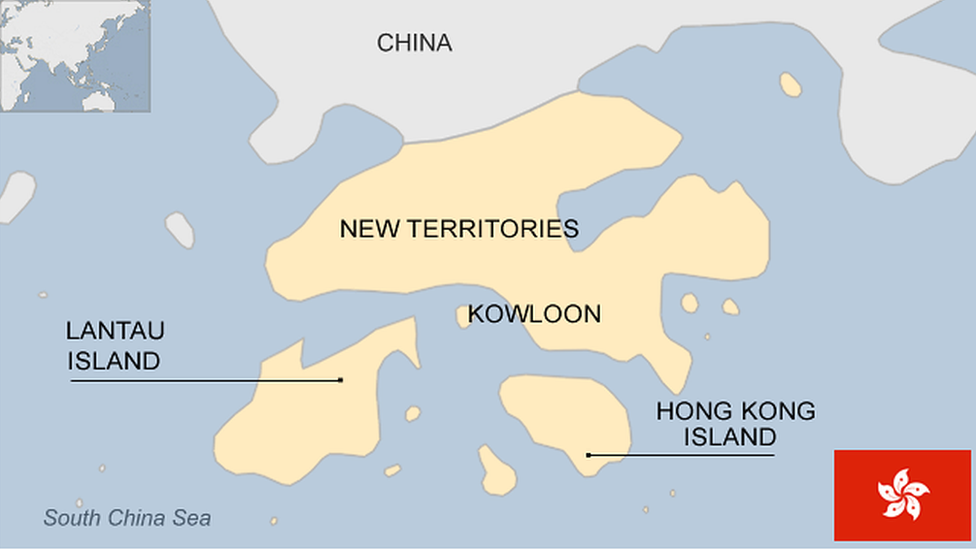Hong Kong sizes up next leader CY Leung's loyalties
- Published
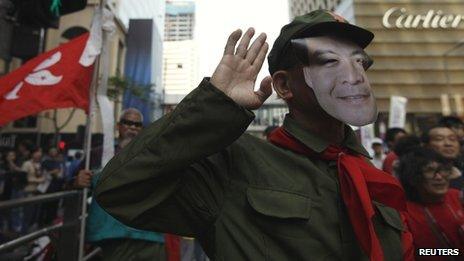
Protesters say Beijing has meddled in Hong Kong's leadership election
The BBC's Juliana Liu meets Hong Kong's next chief executive, amid rumbles from residents over where his loyalties lie.
Over the weekend thousands of marchers took to the streets of Hong Kong's commercial district to protest against what they perceived as Beijing's meddling in the city's political affairs.
The marchers' complaint was a series of reports from local lawmakers that in the run-up to March's chief executive election, Chinese officials strong-armed members of an elite election committee to switch their support from one candidate to another.
As a result the eventual winner, Chief Executive-elect Leung Chun-ying, has now been branded a communist in the eyes of many.
In 1997 Hong Kong was handed back to China, where the Communist Party maintains its grip more than 60 years after coming to power in a bloody civil war.
But to many people in Hong Kong, some of whom come from families that fled communist China, calling someone a communist is an insult.
And if Mr Leung, known here simply as CY, really is a Communist Party member then, by law, he would be barred from serving as chief executive.
The 57-year-old self-made businessman-turned-politician says he is tired of the persistent rumours.
"The fact is I have never been invited to be a member of the Communist Party. I have never been a member of the Communist Party. I am not an underground member of the Communist Party," he emphatically told a group of reporters over tea at Hong Kong's old government office.
Working for free
To Mr Leung's many critics, his denials sound hollow.
At a recent dinner for news executives, when it was his turn to sing karaoke he chose a patriotic song in Mandarin Chinese praising the motherland.
Critics also want him to explain his appointment at the young age of 34 as the head of a committee involved in writing laws to govern Hong Kong's return to China.
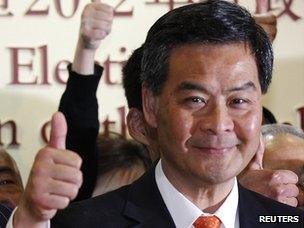
CY Leung says he coined the term land-use rights in his dealings with Beijing
Pressed on the issue, Mr Leung responded in fluent, British-inflected English - the result of three years spent in Bristol studying to be a surveyor.
The son of a police officer, he was born and raised in Hong Kong and returned to the city in 1977 after graduation from university in Britain.
At that time China was reeling from years of chaos suffered during the Cultural Revolution. Hong Kong, by contrast, was a wealthy colony, peering with paranoia over the border.
Despite this, Mr Leung says he joined a group of professionals - lawyers, accountants, engineers, architects, planners and surveyors - who set up a group called the Association of Experts for the Modernisation of China.
Members took the train across the border to Shenzhen - then a fishing village with just a few thousand residents - on weekends at their own expense.
One of the group's first projects was to help Shenzhen prepare a town plan.
"We asked: 'What is your population target?' They said, '300,000 people.' We said: 'Where on earth will you get 300,000 people to come and live in Shenzhen?" Mr Leung recalls.
Shenzhen now has a population of more than 10 million people, nearly all migrants who arrived to take advantage of the growth triggered by Deng Xiaoping's economic reforms.
It vies with Shanghai as the richest city in mainland China.
Real estate pioneer
Mr Leung said his first big break came in 1984, when China was negotiating with Britain on the terms of Hong Kong's eventual return.
By then, he was travelling regularly to Shenzhen, Guangzhou and Shanghai to talk about land matters.
China's foreign ministry had few experts on property rights, so the government turned to him for recommendations on how to deal with expiring leases on the New Territories, the part of Hong Kong closest to the mainland.
Mr Leung said he wrote out his recommendations, based on simple calculations, by hand and sent them to Beijing.
He says they eventually found their way into the Sino-British Joint Declaration governing Hong Kong's return.
"That is one of the things I did for Beijing," he said. "I coined the term land-use rights in Chinese. So that you could have the state owning the land, and private individuals and enterprises owning land-use rights."
In the years after 1984, Mr Leung says he helped Shanghai and Shenzhen with their land policies.
"The first three sales of land, or land-use rights, this side of 1949 were under my hand, pro bono," he adds. "If you piece all this together, you realise that my involvement later on... was neither a surprise nor a coincidence."
'Populist goodies'
Perhaps what is a surprise is how a man who helped shape China's real-estate policy can be so unpopular with Hong Kong's billionaire property moguls, who are perceived to run this city.
Nearly all of them supported Henry Tang, Mr Leung's opponent in the chief executive race, the wealthy heir to a family with roots in Shanghai.
Mr Leung, by contrast, comes from more humble origins and had campaigned on a populist platform.
Li Ka-shing, Asia's richest man and head of Cheung Kong Holdings, supported Mr Tang even after a widely reported meeting with China's presumed next president, Xi Jinping, who was believed to have pressed the tycoon to back Mr Leung.
Because Mr Leung and Mr Tang split the establishment vote, the new chief executive will begin his administration on 1 July with the weakest mandate of any of Hong Kong's previous top leaders.
Willy Lam, a political analyst at the Chinese University of Hong Kong, believes Mr Leung will offer more social welfare benefits and public housing projects as a result.
"He is starting from the low-end of expectations. He could make up for all these doubts and suspicions if he could deliver these populist goodies in the first half year," Mr Lam says.
On a recent visit to the working class area of Sham Shui Po, Mr Leung did indeed promise to provide more public housing for struggling residents.
Observers said it was as if he were still campaigning.
Elected by an elite group with such a slim majority, Mr Leung will no doubt try to seek a mandate from Hong Kong's people.
- Published25 March 2012
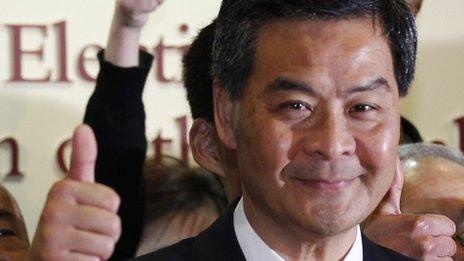
- Published23 March 2012
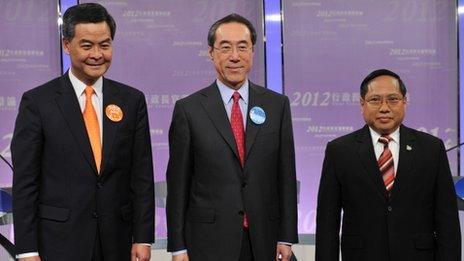
- Published8 February 2012
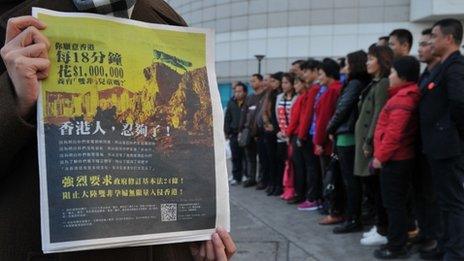
- Published7 January
